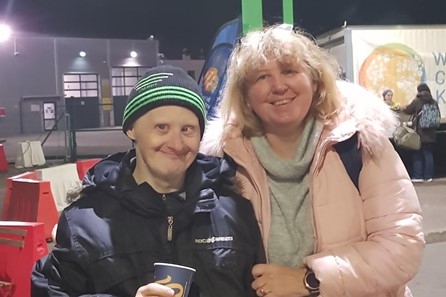Queensland Eye Institute’s Associate Professor Anthony Kwan has performed thousands of cataract surgeries, restoring sight in Queensland and the United Kingdom for more than 30 years. Every successful surgery has changed lives. But every so often there’s a special patient whose story reminds us how transformative this surgery can be.
Ukranian man Viktor Olepir, who lives with down syndrome, fled his home in Kharkiv not long after the Russian invasion in early 2022. When bombs started falling, Viktor took shelter in a subway station. His family, including sister Zoya who’s lived in Queensland since 2012, lost contact with him.
“Eventually we found out he was hiding underground without food, without water, without anything,” Zoya says.
“I thought he was going to die.
“In Ukraine he wouldn’t have access to health services like we have in Australia. People try and save themselves and they don’t worry about people with a disability,” she says.
With help from family and friends in Brisbane, Zoya flew to Poland, then took a bus into Ukraine to find her brother and her husband’s daughter, Anna. Once reunited, Zoya brought them both home to live with her in Goodna, southwest of Brisbane.

Although she’d saved him from Russian bombs, Zoya noticed Viktor struggled to navigate his new home. She knew he had cataracts on both eyes, diagnosed in Ukraine 12 years ago, but didn’t realise how much his sight had deteriorated.
“He was falling over, holding himself up onto things and leaning for stability,” Zoya says.
Viktor was assessed at the Mater Refugee Complex Care Clinic (MRCCC), which provides free health care to asylum seekers with complex healthcare needs and no Medicare card, and the Mater Intellectual Disability and Autism Service (MIDAS).
Faced with a language barrier and Viktor’s intellectual disability, the Mater team relied on Zoya to determine the extent of Viktor’s vision loss, ultimately putting him on a high priority list for urgent cataract surgery.
Queensland Eye Institute retinal specialist and visiting ophthalmologist at the Mater Hospital, Associate Professor Anthony Kwan, successfully performed the first of two planned cataract surgeries on Viktor in June. Surgery to his second eye is scheduled for July.
“This surgery will change his life,” Dr Kwan says. “I’m so happy knowing his vision has been restored – he was near blind.”
Dr Kwan said he had “no idea” Mr Olepir was from a refugee background and that all patients are treated with “equality and based on clinical need”.
When Viktor’s dressing was removed, Zoya said she almost cried at his reaction.
“He was like a kid who sees something amazing for the first time, like ‘Oh! Oh!’”, she says.
“It was unbelievable. I can’t describe it.
“When we left the hospital and walked to the carpark, across the pedestrian crossing, Viktor could see clearly the cars and the drivers, and he waved at them with a big smile.
“Viktor was walking so confidently,” Zoya says, standing tall and puffing out her chest to demonstrate.
“He was holding my hand and waving at the drivers, saying ‘Hello! It’s me!’ And the drivers put down their windows and waved back.
“It made me so happy,” she says.
Zoya runs a busy clothing alterations service, specialising in wedding and formal attire. Since Viktor regained his sight he’s been able to watch television and get around more confidently – “one thousand percent better,” Zoya says.
Advances in cataract surgery
Cataracts are a common eye condition characterized by clouding of the natural lens, resulting in blurred vision and decreased visual acuity.
Since the first cataract surgery was performed in 1949, significant advances have been made, improving outcomes for patients. Cataract surgeries are now generally performed in a day visit to a hospital, with the procedure taking no more than 30 minutes.
Some of the advances include the use of ultrasound waves to break up the cloudy lens, which is replaced with an artificial intraocular lens (IOL). This allows for a faster recovery compared to older techniques.
Improved imaging and measurement techniques such as optical coherence tomography (OCT) and biometry devices allow for more precise measurements of the eye’s dimensions, including the cornea, lens, and axial length. This information helps clinicians choose the correct IOL power and type.
Today, some intraocular lenses can correct refractive errors such as astigmatism and presbyopia, reducing the need for glasses or contact lenses after surgery.
Improved anaesthesia techniques and enhanced postoperative care have improved patient comfort, reduced complications and promoted faster healing.
Ongoing research
Queensland Eye Institute participates in international, multi-centre clinical trials assessing advances in cataract treatments and intraocular lens developments. Learn more about the Queensland Eye Institute Foundation and how you can support our sight-saving research here Academic Research Institute | Eye-related health and diseases | QEIF